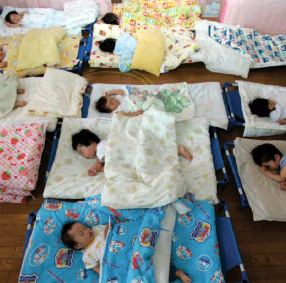æ¥æ¬ã®é«é½¢å
— 2015-09-03Japanâs ageing population points to our global future
âThe stagnation of the lost decades is a symptom of problems brought on by demographic change,â wrote Reiko Aoki, an economist at Hitotsubashi University in Tokyo, last year (Population and Development Review, doi.org/qrc).
Japan has the worldâs oldest population, with a median age of 46 years, an average lifespan of 84, and a quarter of the population over 65. But this doesnât have to mean a gloomy future. What happens in the coming years might even point the way for other countries.
Falling birth rates have put Japanâs fertility at 1.4 children per woman

Japanese longevity canât compensate for its ultra-low fertility rate â just 1.4 children per woman. Hard-working Japanese society has âembraced voluntary mass childlessnessâ, says Nicholas Eberstadt, a demographer at the American Enterprise Institute in Washington DC. One in four donât have children. Some European countries also have low fertility rates, but top up with migrants. Insular Japan does not. The conventional view is that this is bad news: shrinking numbers hobble economic growth and the ageing population is a major financial burden. But Eberstadt says there is another side. The proportion of Japanâs population that is dependent on those of working age isnât unusual, he says, itâs just that it has almost twice as many over-65s as children.
Consequently Japan spends less on education. And because the Japanese are the worldâs healthiest, care bills are also lower than in other nations. Japanâs economy has been growing slowly for two decades now. But that too is deceptive, says William Cline of the Peterson Institute for International Economics in Washington DC. Thanks to the falling population, individual income has been rising strongly â outperforming most US citizensâ.
With 127 million people, Japan is hardly empty. But fewer people in future will mean it has more living space, more arable land per head, and a higher quality of life, says Eberstadt. Its demands on the planet for food and other resources will also lessen.
Japan isnât alone in demographic contraction: Russia, Romania and Hungary all follow the trend. For many more, it is being delayed by immigration. But the global population bomb is slowly being defused. As Swedish statistician Hans Rosling first noted, the world recently reached âpeak childâ â the point where the number of children aged 0 to 14 around the globe levels off. Global fertility rates have halved in 40 years â they are now below 2.5 children per woman â and global population may peak soon.
So, far from being a demographic outlier, Japan is âthe world leader in demographic changeâ, says Aoki. For some this sounds like a disaster. China last year relaxed its one-child policy fearing that predicted population decline in the 2030s would choke its economic development. But others believe that peak population is a necessary first step to reducing our assault on the planet. In that case, following Japanâs example may be just the ticket. Fred Pearce.
Translated by Google Source : New Scientist Jan 2014
æ¥æ¬ã®é«é½¢åã¯ãå½ç¤¾ã®ã°ãã¼ãã«ãªæªæ¥ãæãã¦ãã¾ãã
ãã®åºççã«ãã£ã¦å½å®¶ã®éå½è¨å®ããã¦ãã¾ããï¼æ¥æ¬ã®äººå£ã¯2013å¹´ã«ç¾ä¸ã®ã»ã¼4åã®1æ¸å°ãããã¨ãçºè¡¨ – äºå¹´é£ç¶ã®ä¸è½ã¯ – å½ã¯ã端æ«è¡°éã§ãã£ã¦ãããè¦åãããããã¾ããã
ã失ãããåå¹´ã®åæ»ã¯ã人å£åæ
ã®å¤åã«ãã£ã¦ããããããåé¡ã®çç¶ã§ããããéæ¨ç²åãæ±äº¬ã®ä¸æ©å¤§å¦ãæ¨å¹´ï¼äººå£ã¨éçºã¬ãã¥ã¼ãdoi.org/qrcï¼ã®ã¨ã³ããã¹ãã¯æ¸ãã¦ãã¾ãã
æ¥æ¬ã¯46å¹´ã®å¹´é½¢ã®ä¸å¤®å¤ã84ã®å¹³å寿å½ãããã³65以ä¸ã®äººå£ã®4åã®1ã§ãä¸çæå¤ã®äººå£ãæã£ã¦ãã¾ããããããããã¯æ²è¦³çãªæªæ¥ãæå³ããå¿
è¦ã¯ããã¾ãããä½ããã£ã¦ããä»ã®å½ã¸ã®éãæãã¦ããå¯è½æ§ãããã¾ãä»å¾æ°å¹´éã«çºçãã¾ãã
åºççã¯å¥³æ§ããã1.4åã©ããã¡ã«æ¥æ¬ã®ä¸å¦æ²»çãå
¥ãã¦ãã¾ãã
女æ§ãããã®ã¡ããã©1.4åä¾ãã¡ – æ¥æ¬ã®é·å¯¿ã¯ããã®è¶
ä½åºççãè£ããã¨ã¯ã§ãã¾ãããå¤åãªæ¥æ¬ç¤¾ä¼ã¯ãèªçºçãªè³ªéchildlessnessãåãå
¥ãããã¨ããã³ã©ã¹Eberstadtãã¯ã·ã³ãã³DCã®ã¢ã¡ãªã«ã³ã»ã¨ã³ã¿ã¼ãã©ã¤ãºç 究æã§ã®äººå£çµ±è¨å¦è
ã¯è¨ãã¾ãã 4人ã«1人ã¯ãåä¾ãæã£ã¦ãã¾ãããä¸é¨ã®æ¬§å·è«¸å½ã¯ã¾ããä½åºççãæã£ã¦ãã¾ããã移ä½è
ã¨ãããã¢ããã島å½æ¥æ¬ã«ã¯ããã¾ãããå¾æ¥ã®ãã¥ã¼ã¯ãããã¯æªããã¥ã¼ã¹ã§ããã¨ãããã¨ã§ãï¼ç¸®å°æ°åã¯ãçµæ¸æé·ã¨äººå£ã®é«é½¢åã主è¦ãªè²¡æ¿è² æ
ã§å°ããããããEberstadtã¯å¥ã®å´é¢ãããã¨è¨ãã¾ããå´åå¹´é½¢ã®ãã®ã«ä¾åãã¦ããæ¥æ¬ã®äººå£ã®å²åã¯çãããã¨ã§ã¯ãªããã¨å½¼ã¯è¨ããããã¯åä¾ã®ããã«ãªã¼ãã¼65Sã»ã¼2åå¤ããæã£ã¦ããã ãã§ãã
ãã®çµæãæ¥æ¬ã¯æè²ã«ãã¾ããè²»ããã¦ãã¾ããæ¥æ¬ã¯ãä¸çã®å¥åº·ã§ããããã¨ãã±ã¢æ³æ¡ã¯ã¾ããä»ã®å½ã«æ¯ã¹ã¦ä½ããªã£ã¦ãã¾ããæ¥æ¬çµæ¸ã¯ç¾å¨ãäºåå¹´ã®ããã«ãã£ããã¨æé·ãã¦ãã¾ãããããããã¾ãã«ã欺ççã§ãããã¨ããã¯ã·ã³ãã³DCã®ãã¼ã¿ã¼ã½ã³å½éçµæ¸ç 究æã®ã¦ã£ãªã¢ã ã»ã¯ã©ã¤ã³æ°ã¯è¿°ã¹ã¦ãã¾ããè½ä¸äººå£ã®ãããã§ãå人æå¾ãå¼·ãä¸æãã¦ãã – ã»ã¨ãã©ã®ç±³å½å¸æ°ãä¸åãã¾ããã
1.27å人ã¨ãæ¥æ¬ã¯ã»ã¨ãã©ç©ºã§ããããããå°æ¥çã«ã¯ããå°ãªã人ã
ã¯ããããããå¤ãã®ç活空éãããããããã®èå°ãããã³é«ãçæ´»ã®è³ªãæã£ã¦ããæå³ãã¾ããEberstadtæ°ã¯è¿°ã¹ã¦ãã¾ããé£åããã®ä»ã®ãªã½ã¼ã¹ã®ããã®å°çä¸ã§ãã®éè¦ã軽æ¸ããã¾ãã
æ¥æ¬ã¯ã人å£çµ±è¨å縮ã ãã§ã¯ãªãï¼ãã·ã¢ãã«ã¼ããã¢ããã³ã¬ãªã¼ã®ãã¹ã¦ã®å¾åã«å¾ã£ã¦ãã ãããããå¤ãã®ããã«ãããã¯ç§»æ°ã«ãã£ã¦é
延ããã¦ãã¾ããããããä¸ç人å£ã®çå¼¾ãå¾ã
ã«åããããã¦ãã¾ããåã©ãã®æ°ãä¸çã¬ãã«ç´14ãªãã«0æ³ã®ãã¤ã³ã – ã¹ã¦ã§ã¼ãã³çµ±è¨å¦è
ãã³ã¹ã»ãã¹ãªã³ã°ãæåã«è¿°ã¹ãããã«ãä¸çã¯æè¿ãããã¼ã¯åãã«éãã¾ãããå½¼ãã¯ä»ã女æ§ããã2.5人ã®åä¾ã®ä¸ã«ãã – – ã°ãã¼ãã«åºççã¯40å¹´ã§åæ¸ãã¦ãããä¸çã®äººå£ã¯ããã«ãã¼ã¯ã«éãããã¨ãããã¾ãã
ããã§ãããã¾ã§ã®äººå£çµ±è¨å¦çç°å¸¸å¤ã§ãããã¨ãããæ¥æ¬ã¯ã人å£åæ
ã®å¤åã®ä¸ççãªã¼ãã¼ãã§ãéæ¨æ°ã¯è¿°ã¹ã¦ãã¾ããä¸é¨ã§ã¯ãããã¯ç½å®³ã®ããã«èããã¾ããä¸å½ã¯æ¨å¹´ã2030年代ã«ãããäºæ¸¬äººå£æ¸å°ãçµæ¸çºå±ããã§ã¼ã¯ã§ããããã¨ãæãããã®ä¸äººã£åæ¿çãç·©åãã¾ãããããããä»ã®äººããã¼ã¯äººå£ã¯å°çä¸ã§ç§ãã¡ã®æ»æã軽æ¸ããããã«å¿
è¦ãªç¬¬ä¸æ©ã§ããã¨èãã¦ãã¾ãããã®å ´åã«ã¯ãæ¥æ¬ã®ä¾ã«å¾ããã¨ã ãã§ãã±ããå ´åãããã¾ãããã¬ãããã¢ã¼ã¹ã





Leave a reply
You must be logged in to post a comment.